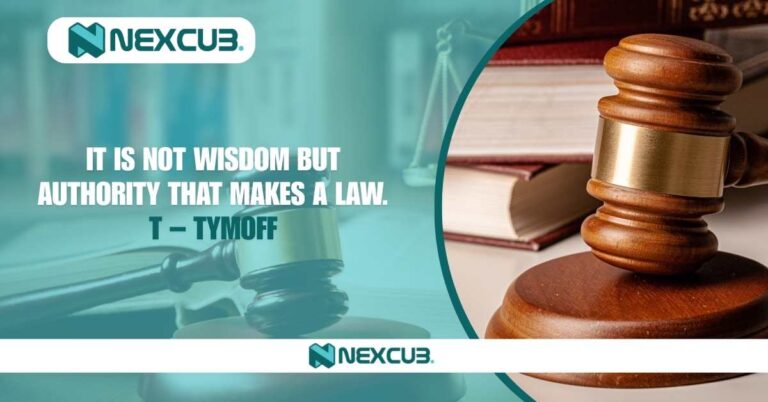Our Location
304 North Cardinal St.
Dorchester Center, MA 02124

Laws shape society, offering structure and justice. However, the famous quote, “It is not wisdom but authority that makes a law,” by Tymoff sparks a debate. It reminds us that while authority enforces laws, their foundation must align with fairness and reason. Without wisdom, authority risks creating laws that fail to serve the people.
In a world driven by power and influence, this quote challenges us to reflect: Are our laws built on wisdom or just authority? Let’s unpack this idea further.
A law is a rule or system designed to regulate behavior and ensure fairness in society. Laws provide a framework for maintaining order, resolving disputes, and protecting rights. While laws vary across nations, their purpose remains universal: promoting justice and harmony.
Legal systems, whether democratic or authoritarian, shape the way laws are created and enforced, making them an essential pillar of civilization.
Authority plays a critical role in implementing and enforcing laws. It ensures compliance, using tools like courts, police, and government bodies. However, authority is more than enforcement—it represents the power to decide what becomes law.
Without authority, even the wisest laws would lack the strength to influence society. This highlights why authority must act responsibly and with accountability.
| Aspect | Wisdom | Authority |
| Definition | Insight, experience, and knowledge to make fair decisions. | Power or control to enforce rules and commands. |
| Focus | Ethical and just outcomes for the greater good. | Ensuring compliance and maintaining order. |
| Basis | Rooted in understanding, empathy, and foresight. | Rooted in hierarchy, roles, or institutional power. |
| Approach | Seeks solutions that align with morals and fairness. | Implements decisions based on rules or mandates. |
| Dependence | Requires respect and acceptance to influence decisions. | Relies on positional power or legal backing to enforce. |
| Examples | Crafting policies that adapt to societal needs. | Enforcing laws or regulations through penalties. |
| Outcome | Creates trust and long-term harmony in society. | Ensures order but may lack deeper public acceptance. |
| Potential Pitfall | Can be ineffective without authority to act. | May create unfair laws if not guided by wisdom. |
This comparison highlights the need for wisdom and authority to work together to create and enforce laws that are both fair and effective.
Throughout history, the relationship between authority and law has shaped civilizations. Ancient rulers like Hammurabi established laws to maintain order and control. The Code of Hammurabi, for example, emphasized strict enforcement, showing how authority was key to early legal systems.
In contrast, philosophers like Aristotle argued that laws should reflect wisdom and moral reasoning, not just power. These opposing views highlight a timeless debate: Should laws be rooted in wisdom or enforced by authority?
Tymoff’s quote, “It is not wisdom but authority that makes a law,” highlights the critical role authority plays in enforcing laws. However, wisdom still plays an influential role in shaping the laws that are created.

While authority ensures that laws are upheld, wisdom provides the ethical foundation that makes laws just and effective. Without wisdom, laws might become rigid and disconnected from societal needs. This balance of authority and wisdom is essential to creating laws that not only maintain order but also respect human rights and promote fairness.
Wisdom guides decision-makers to create laws that evolve with society, while authority ensures they are implemented and followed. Tymoff’s perspective serves as a reminder that while authority enforces laws, the inclusion of wisdom helps ensure that laws are moral, adaptable, and beneficial to society.
Thomas Hobbes, a 17th-century philosopher, emphasized the importance of authority in maintaining social order. In his famous work Leviathan, Hobbes argued that without powerful authority, society would descend into chaos—a “state of nature” where life would be “nasty, brutish, and short.”
He believed that individuals must surrender some freedoms to a sovereign authority for the greater good. For Hobbes, authority was essential to create and enforce laws, ensuring peace and stability. However, his views also raise questions about how much power authority should hold and whether it can exist without wisdom guiding its actions.
Balancing authority and wisdom is crucial for creating fair and effective laws. Authority provides the power to enforce rules, while wisdom ensures those rules are ethical and beneficial. Without authority, even the wisest laws lack the force to influence behavior.
Conversely, authority without wisdom risks creating unjust or oppressive systems. A well-functioning society thrives when both work together, ensuring laws are rooted in fairness yet backed by the strength to maintain order.
In modern society, the balance between wisdom and authority impacts everything from government policies to workplace regulations. For instance, laws addressing technology, climate change, or human rights require both the foresight of wisdom and the enforcement power of authority.
When wisdom guides authority, laws reflect justice and adapt to societal needs. Striking this balance is essential to building trust, ensuring equity, and fostering progress in an ever-evolving world.
Placing too much emphasis on authority can lead to rigid and unjust systems. Laws driven solely by power may overlook ethical considerations, resulting in public distrust or resistance.
When authority dominates without being tempered by wisdom, it can suppress individual freedoms and create societal divides. A historical example is authoritarian regimes where laws enforced control but ignored fairness, ultimately leading to instability.
Thomas Hobbes remains influential for highlighting the role of authority in preventing chaos. In Leviathan, he argued that strong authority is essential to maintain order, particularly in societies prone to conflict.
While his ideas may seem strict, they underscore the need for governance to protect people from societal breakdown. However, Hobbes’s philosophy also serves as a reminder that unchecked authority can stifle liberty and innovation, calling for a balanced approach.
Read: The Trulife Distribution Lawsuit (Updates) 2024
Creating laws involves navigating the delicate interplay between wisdom and authority. Lawmakers must consider ethics, societal needs, and the practicalities of enforcement. Modern challenges like technology, global trade, and climate change add further complexity, requiring both thoughtful insight and decisive action. Striking this balance ensures laws are effective, adaptable, and just.
Legal challenges are vital for refining and shaping laws over time. They provide a system for individuals or groups to question the fairness or constitutionality of existing rules.
Through courts and appeals, legal challenges ensure that laws stay relevant and aligned with societal values. This process promotes accountability, preventing authority from abusing its power.

Key Points About Legal Challenges:
In today’s world, the relationship between authority and wisdom continues to spark debates. Modern legal systems must navigate complex issues like human rights, technology, and social justice. While authority ensures laws are enforced, wisdom ensures that laws remain fair and just.
Contemporary challenges, such as data privacy and environmental protection, demand that authority adapt to changing needs while being guided by ethical reasoning. The tension between maintaining order and promoting justice remains as relevant as ever.
Ethical considerations are at the heart of creating just laws. Wisdom ensures laws protect human dignity, equality, and freedom. Ethical dilemmas often arise when authority enforces laws that may conflict with moral values.
For example, issues like capital punishment or surveillance bring forth the question of whether enforcing authority is justified if it violates ethical principles. Striking the right balance between legal authority and ethical reasoning is essential to avoid injustice and ensure laws serve the public good.
Accountability is crucial in both lawmaking and governance, ensuring that those in positions of power act responsibly. It keeps authorities in check, preventing misuse of power and protecting citizens’ rights. When leaders and institutions are held accountable, it builds trust and promotes transparency in the legal system. Accountability ensures laws are fair, consistently applied, and aligned with societal values.
By prioritizing accountability, societies create a legal system that is both effective and just, empowering citizens and protecting their rights.
The balance between authority and wisdom is essential for creating just and effective laws. Accountability plays a critical role in ensuring that laws are enforced fairly and that those in power remain responsible. By integrating ethical considerations and legal philosophy, societies can adapt to modern challenges while upholding justice. Ultimately, a well-structured legal system that values both authority and wisdom fosters fairness, protects individual rights, and strengthens societal trust.